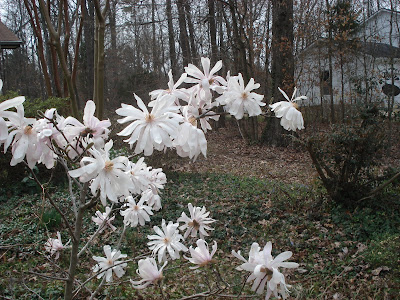1. President Obama's speech on Monday night was thoughtful and compelling. I understand his decision to intercede in Libya, and I appreciate his determination to protect others from genocide.
2. I don't understand, though, where the money comes from to fund warfare in America. It's like a giant keg at a frat party--simply turn on the spigot and let the gold flow. Troop escalations, no-fly zones, pre-emptive wars--the money is always there.
3. But when it comes to domestic needs, we're broke. Our Congress is now arguing over which vulnerable group to stiff next, and we don't have money to feed our hungry or educate our children.
4. Are we the world's self-sacrificing protector?
5. Or are we simply in love with war?
Thursday, March 31, 2011
Thoughts on Libya
Labels:
Afghanistan,
Barack Obama,
Education,
Ethics,
Health,
Inequality,
Libya,
War
Monday, March 28, 2011
Heaven
One day last week I took a nap on the couch at my daughter's theater class. I drifted off to sleep listening to the laughter and cheerful banter of children.
If angels really exist, and if they sing in heaven, I know what they sound like.
If angels really exist, and if they sing in heaven, I know what they sound like.
Thursday, March 24, 2011
Spring Reflections
Sometimes I wonder how much Mother Earth can take--with missiles exploding in Libya and radioactive iodine leaching into the water of Tokyo. Yet here in North Carolina spring has arrived with its usual beauty.

Named for the 18th-century Scottish botanist William Forsyth, forsythia is native to China. Oddly enough, its flowers can produce lactose. For me, forsythia is forever linked to tennis, for as a child I practiced hitting tennis balls against the side of our garage next to these brilliant yellow flowers.

The eastern redbud, or Judas tree, comes from the Greek word for weaver's shuttle. Supposedly the tree upon which Judas Iscariot hung himself, the original white flowers turned red with blood and shame--though the flowers as we know them are pink. Perhaps, then, the suicide is meant to be seen as a more muted and nuanced event, and not as a stark or harsh act suggested by the color of blood.

The star magnolia is native to Honshu, Japan's largest island. Off its coast is where the earthquake hit and the tsunami began.

Phlox comes from the Greek word for flame, closely related to the word phlegein, which means "to burn"--kind of like Libya and Japan.

The helleborus, or Lenten rose, is not a rose. Many of its species are poisonous, and it was used in witchcraft to summon demons. In Greek mythology, though, Melampus of Pylos used hellebore to save the daughters of the king of Argos from madness.
Maybe nothing is as it seems. Maybe, in the end, all we see is "through a glass, darkly," as the Apostle Paul tells us.
It's just that in the spring the colors are so beautiful. So heartbreakingly beautiful.

Named for the 18th-century Scottish botanist William Forsyth, forsythia is native to China. Oddly enough, its flowers can produce lactose. For me, forsythia is forever linked to tennis, for as a child I practiced hitting tennis balls against the side of our garage next to these brilliant yellow flowers.

The eastern redbud, or Judas tree, comes from the Greek word for weaver's shuttle. Supposedly the tree upon which Judas Iscariot hung himself, the original white flowers turned red with blood and shame--though the flowers as we know them are pink. Perhaps, then, the suicide is meant to be seen as a more muted and nuanced event, and not as a stark or harsh act suggested by the color of blood.

The star magnolia is native to Honshu, Japan's largest island. Off its coast is where the earthquake hit and the tsunami began.

Phlox comes from the Greek word for flame, closely related to the word phlegein, which means "to burn"--kind of like Libya and Japan.

The helleborus, or Lenten rose, is not a rose. Many of its species are poisonous, and it was used in witchcraft to summon demons. In Greek mythology, though, Melampus of Pylos used hellebore to save the daughters of the king of Argos from madness.
Maybe nothing is as it seems. Maybe, in the end, all we see is "through a glass, darkly," as the Apostle Paul tells us.
It's just that in the spring the colors are so beautiful. So heartbreakingly beautiful.
Monday, March 21, 2011
Center Stage
Remember the beginning of the year when nothing was happening? Well, in three short months the world's turned upside-down. Revolutions, earthquakes, and bombs erupt so fast that they push each other off the front page. And while most of these upheavals are happening abroad, their long-term impacts won't remain so. As Thomas Friedman described yesterday in The New York Times, the resulting pattern of higher oil prices and climate disruptions leading to higher food prices and to greater instability will continue to loop back on itself in the absence of strong American leadership.
Enter Barack Obama, a leader whose erratic pattern loops back on itself as well. We've seen in his first two years a tendency to retreat--an inability or unwillingness to exercise his might. Friedman cites, for example, the President's lack of leadership specifically on climate and fiscal policy. Time and again the President defers to our inept Congress when his own words would carry more weight.
We've heard from President Obama on Libya, and he spoke out--finally and forcefully--on behalf of the Egyptian revolution. He needs to continue this pattern of staying on the front page. As the world feels like it's spinning out of control, the American President can't recede into the background.
We can't afford this, and--as Friedman makes clear--neither can the world.
Enter Barack Obama, a leader whose erratic pattern loops back on itself as well. We've seen in his first two years a tendency to retreat--an inability or unwillingness to exercise his might. Friedman cites, for example, the President's lack of leadership specifically on climate and fiscal policy. Time and again the President defers to our inept Congress when his own words would carry more weight.
We've heard from President Obama on Libya, and he spoke out--finally and forcefully--on behalf of the Egyptian revolution. He needs to continue this pattern of staying on the front page. As the world feels like it's spinning out of control, the American President can't recede into the background.
We can't afford this, and--as Friedman makes clear--neither can the world.
Labels:
Barack Obama,
Egyptian Revolution,
Energy Policy,
Environment,
War
Thursday, March 17, 2011
Vicissitudes
Last week when my daughter was home for spring break, I thought of how often families adjust to the small vicissitudes of life—of a child starting kindergarten or spending a summer at camp or returning home when everyone’s used to her being gone. Everyone in the family needs to regroup and figure out the new dynamics. Often this process is hard on people, and I found myself sympathizing with those who struggle with such daily challenges.
Then the earthquake hit and the tsunami came. We watched in horror as the vast, relentless water overtook one community after another, and people who looked as tiny as ants fled for their lives. As if to heighten our insignificance, four nuclear reactors are now following their own laws of physics, and no one knows what will happen.
When the earth shatters beneath us—as it does when serious illness hits or we lose people we love—the small vicissitudes take on new meaning. They become sources of joy.
Revel in them, for change is the only constant in life. And the best change of all is the growth of children as they thrive and find their way in this often frightening world.
Then the earthquake hit and the tsunami came. We watched in horror as the vast, relentless water overtook one community after another, and people who looked as tiny as ants fled for their lives. As if to heighten our insignificance, four nuclear reactors are now following their own laws of physics, and no one knows what will happen.
When the earth shatters beneath us—as it does when serious illness hits or we lose people we love—the small vicissitudes take on new meaning. They become sources of joy.
Revel in them, for change is the only constant in life. And the best change of all is the growth of children as they thrive and find their way in this often frightening world.
Monday, March 14, 2011
Thursday, March 10, 2011
National White Man's History Month?
The season of minority history months is upon us. In February we celebrated Black History Month, and in March we observe Women's History Month. Skip ahead to May and we honor the heritage of both Jewish Americans and Asian Pacific Americans.
To all of us who are considered minorities, I say, "STAND UP AND BE COUNTED." For we outnumber those tenacious white men, whose history for so long has defined the rest of us.
Perhaps it's time to give them their own month, instead of an entire millennium. They could go in January, along with National Oatmeal Month; in April to accompany National Grilled Cheese Sandwich Month; or perhaps in June, sharing the stage with National Hamburger Month.
Then again, there's always April 1.
To all of us who are considered minorities, I say, "STAND UP AND BE COUNTED." For we outnumber those tenacious white men, whose history for so long has defined the rest of us.
Perhaps it's time to give them their own month, instead of an entire millennium. They could go in January, along with National Oatmeal Month; in April to accompany National Grilled Cheese Sandwich Month; or perhaps in June, sharing the stage with National Hamburger Month.
Then again, there's always April 1.
Monday, March 7, 2011
"We Should Make Our Goals"
Guest columnist Miranda Straubel, a 4th grader, writes today about benchmark tests used in the public schools to evaluate student progress. Like most of the tests associated with the "No Child Left Behind Act" and the newer "Race to the Top" funds, these often generate more problems than the tests are worth.
"We should make our goals." That is what my teacher says all day long. Our goals are to get 3 or 4 more correct answers than the previous benchmark. We should underline important words and numbers, show our work, and check our answers. So on, so forth.
This is very important. If we make our goals, we get entered into a drawing to win a laptop. Nice, right? Well, actually, not really. See, I scored 41 our of 45 on the last benchmark for reading. As my dad says, "You can practically only go down from there." We also get 15 minutes of extra recess if we make our goals. Not very fair, I would say.
How about you? Please comment with your opinion below.
"We should make our goals." That is what my teacher says all day long. Our goals are to get 3 or 4 more correct answers than the previous benchmark. We should underline important words and numbers, show our work, and check our answers. So on, so forth.
This is very important. If we make our goals, we get entered into a drawing to win a laptop. Nice, right? Well, actually, not really. See, I scored 41 our of 45 on the last benchmark for reading. As my dad says, "You can practically only go down from there." We also get 15 minutes of extra recess if we make our goals. Not very fair, I would say.
How about you? Please comment with your opinion below.
Thursday, March 3, 2011
Free Speech
Yesterday's Supreme Court ruling that protected hateful protests at military funerals brought home the gravity of our first amendment.
A caller on NPR's Talk of the Nation named Brian, whose brother died in the war on terrorism, explained what free speech means to him. Members of the Westboro Baptist Church showed up at his brother's funeral, he told listeners, but "the counter-protest of over 400 people completely muted anything they had to say . . . While personally it was very distressing and personally they crossed the line, I know that my brother was defending the Constitution. . . and I believe we need to keep it intact."
I especially appreciate our nation's freedoms--those that we often take for granted--when someone like Brian articulates what's at stake.
A caller on NPR's Talk of the Nation named Brian, whose brother died in the war on terrorism, explained what free speech means to him. Members of the Westboro Baptist Church showed up at his brother's funeral, he told listeners, but "the counter-protest of over 400 people completely muted anything they had to say . . . While personally it was very distressing and personally they crossed the line, I know that my brother was defending the Constitution. . . and I believe we need to keep it intact."
I especially appreciate our nation's freedoms--those that we often take for granted--when someone like Brian articulates what's at stake.
Labels:
Afghanistan,
Free Speech,
Iraq,
Supreme Court
Subscribe to:
Comments (Atom)

